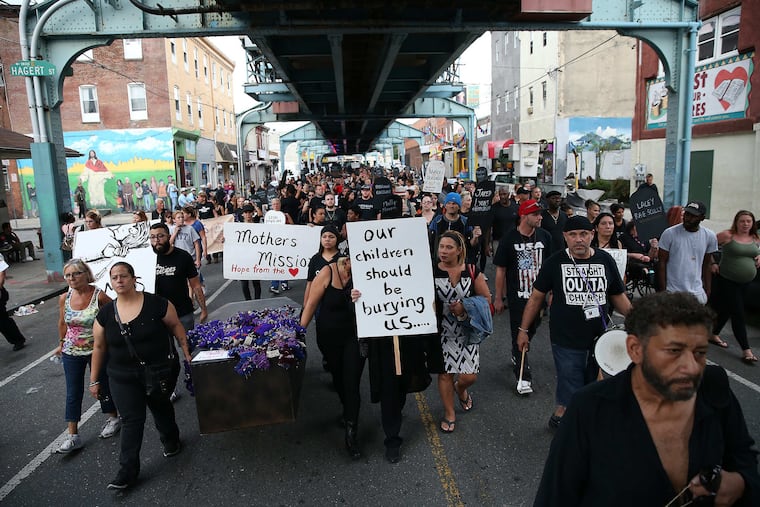Nearly 3 in 10 Philadelphians know someone who’s died from opioid use, Pew survey finds
Researchers said they were surprised by how deeply the crisis has affected the entire city.

In a stark illustration of the depths of Philadelphia’s opioid crisis, a new survey of city residents found that nearly a third — 29% — know someone who has died from opioid use.
The survey, conducted by the Pew Charitable Trusts among 600 Philadelphians this spring, was an attempt to fill in some of the gaps that still exist in data surrounding the crisis.
“We have the death rates,” said Larry Eichel, the director of Pew’s Philadelphia Research Initiative — 1,217 overdose deaths in 2017 and 1,116 in 2018, the vast majority of them from the deadly synthetic opioid fentanyl. “But there wasn’t much data of the impact of the crisis on residents in the neighborhoods. That’s what we wanted to look at.”
He was surprised, he said, by how deeply the crisis has affected the entire city.
White respondents were most likely to have known someone who died from opioids — 40% of white survey respondents, 27% of Hispanic respondents, and 21% of black respondents said they knew a person who had died from opioid use. Residents of the River Wards, which include the Kensington neighborhood that is the epicenter of the city’s overdose crisis, were most likely to have lost someone to opioids.
Among age groups, 30- to 49-year-olds have lost more acquaintances, friends, and family than any other in the city: 42% said they knew someone who had died from opioid use.
Still, Eichel said, even though some groups were more affected than others, the crisis is cutting across large swaths of the population, affecting all incomes and all education levels almost equally.
Thirty-one percent of respondents said they knew someone with an opioid addiction, with white Philadelphians, people between 30 and 49, and residents of the River Wards and South Philadelphia most likely to say so.
Forty-one percent of Philadelphians surveyed — and 64% of River Wards residents — said that the opioid crisis has negatively affected the quality of life in their neighborhood.
“The impact is felt more intensively in the River Wards, but it’s pretty substantial in lots of places,” Eichel said. “Yes, the crisis is felt more strongly in some parts of the city, and by some groups of people, but it’s felt by everybody.”